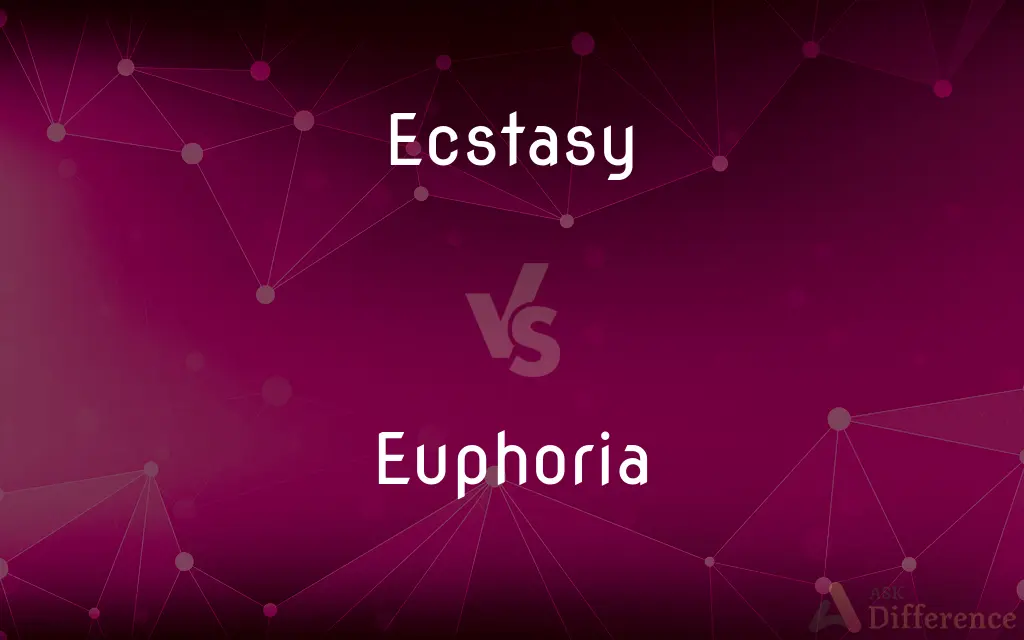Ecstasy vs. Euphoria — What's the Difference?
By Tayyaba Rehman — Updated on November 3, 2023
Ecstasy refers to an overwhelming feeling of intense joy or delight, often with a sense of transcendence. Euphoria is a state of intense happiness and self-confidence.

Difference Between Ecstasy and Euphoria
Table of Contents
ADVERTISEMENT
Key Differences
Ecstasy is a state of rapturous delight often characterized by a loss of self-control and total immersion in the experience of joy or pleasure. Euphoria, while also a state of heightened pleasure, typically allows for more self-awareness and control than ecstasy.
Ecstasy is often used to describe a peak emotional or spiritual state, sometimes induced by intense experiences or substances, which can transport a person beyond ordinary consciousness. Euphoria is generally considered a psychological and physiological state that can result from a variety of factors, such as achievements, drugs, or positive life events, without necessarily implying a loss of consciousness or self-awareness.
In ecstasy, the emotional depth can be such that it becomes a transformative experience, sometimes described as transcendent or otherworldly. Euphoria, though intensely pleasurable, is usually described in a more grounded, earthly context, often associated with well-being or elation that, while powerful, doesn't fundamentally alter one's perception of reality.
Ecstasy may be experienced less frequently in daily life, often associated with life-changing events, spiritual epiphanies, or deep connections with art or music. Euphoria, on the other hand, can be more commonly encountered, associated with everyday successes, enjoyable activities, or the effect of certain medications.
Ecstasy can sometimes lead to a state where the individual is so overwhelmed by positive feelings that they may be oblivious to their surroundings or social norms. In contrast, euphoria, although potent, usually allows an individual to remain engaged with their environment and retain a sense of the present reality.
ADVERTISEMENT
Comparison Chart
Intensity
Intense, overwhelming joy
Intense happiness, less overwhelming
Self-awareness
Reduced, with possible loss of self-control
Maintained, with a sense of self-confidence
Frequency
Less common, often transformative
More common, can be experienced regularly
Association
Spiritual, transcendental experiences
Achievements, well-being, positive life events
Perception
Altered, otherworldly
Enhanced but grounded in reality
Compare with Definitions
Ecstasy
Intense joy that surpasses normal levels of happiness
She was in ecstasy after the birth of her child.
Euphoria
An intense state of pleasure and well-being
The good news filled her with euphoria.
Ecstasy
A euphoric state sometimes induced by drugs
The drug MDMA is commonly known as ecstasy.
Euphoria
A strong feeling of elation and joy
Winning the award caused him an indescribable euphoria.
Ecstasy
A trance-like state of transcendental happiness
In her spiritual ecstasy, she felt at one with the universe.
Euphoria
A state of happiness that often follows success
After receiving her promotion, she was in a state of euphoria for days.
Ecstasy
Intense joy or delight.
Euphoria
A feeling of great happiness and excitement
He felt a sense of euphoria as he crossed the finish line first.
Ecstasy
A state of emotion so intense that one is carried beyond rational thought and self-control
An ecstasy of rage.
Euphoria
Euphoria ( (listen)) is the experience (or affect) of pleasure or excitement and intense feelings of well-being and happiness. Certain natural rewards and social activities, such as aerobic exercise, laughter, listening to or making music and dancing, can induce a state of euphoria.
Ecstasy
The trance, frenzy, or rapture associated with mystic or prophetic exaltation.
Euphoria
A feeling or state of intense excitement and happiness
In his euphoria, he had become convinced he could defeat them
Ecstasy
Often Ecstasy(Slang) MDMA.
Euphoria
A feeling of great happiness or well-being.
Ecstasy
Intense pleasure.
Euphoria
An excited state of joy; a feeling of intense happiness.
The runner was in (a state of) absolute euphoria after winning his first marathon.
Ecstasy
A state of emotion so intense that a person is carried beyond rational thought and self-control.
Euphoria
(LGBT) gender euphoria
Ecstasy
A trance, frenzy, or rapture associated with mystic or prophetic exaltation.
Euphoria
A strong pleasant feeling of well-being or happiness; it is often caused by attainment of a desired goal or other incident of accomplishment, but may irrationally accompany a pathological manic state.
Ecstasy
(obsolete) Violent emotion or distraction of mind; excessive grief from anxiety; insanity; madness.
Euphoria
A feeling of great (usually exaggerated) elation
Ecstasy
(slang) The drug MDMA, a synthetic entactogen of the methylenedioxyphenethylamine family, especially in a tablet form.
Euphoria
A medical condition of abnormal, often temporary, heightened happiness
The patient experienced euphoria as a side effect of the medication.
Ecstasy
A state in which sensibility, voluntary motion, and (largely) mental power are suspended; the body is erect and inflexible;
Ecstasy
(intransitive) To experience intense pleasure.
Ecstasy
(transitive) To cause intense pleasure in.
Ecstasy
The state of being beside one's self or rapt out of one's self; a state in which the mind is elevated above the reach of ordinary impressions, as when under the influence of overpowering emotion; an extraordinary elevation of the spirit, as when the soul, unconscious of sensible objects, is supposed to contemplate heavenly mysteries.
Like a mad prophet in an ecstasy.
This is the very ecstasy of love.
Ecstasy
Excessive and overmastering joy or enthusiasm; rapture; enthusiastic delight.
He on the tender grassWould sit, and hearken even to ecstasy.
Ecstasy
Violent distraction of mind; violent emotion; excessive grief of anxiety; insanity; madness.
That unmatched form and feature of blown youthBlasted with ecstasy.
Our words will but increase his ecstasy.
Ecstasy
A state which consists in total suspension of sensibility, of voluntary motion, and largely of mental power. The body is erect and inflexible; the pulsation and breathing are not affected.
Ecstasy
To fill ecstasy, or with rapture or enthusiasm.
The most ecstasied order of holy . . . spirits.
Ecstasy
A state of being carried away by overwhelming emotion;
Listening to sweet music in a perfect rapture
Ecstasy
A state of elated bliss
Ecstasy
Street names for methylenedioxymethamphetamine
Ecstasy
Overpowering emotion that transcends ordinary experiences
At the concert, he was in a state of ecstasy.
Ecstasy
A state of being overpowered by delight or overwhelming feelings
The dancer spun in ecstasy, lost in the music.
Common Curiosities
Can ecstasy be dangerous?
If induced by substances or when losing awareness of surroundings, ecstasy can pose risks.
How long does ecstasy last?
The duration of ecstasy varies, depending on its cause, from moments to hours.
Is euphoria a sign of mental health?
Euphoria can be a natural response to positive events, but abnormal euphoria may indicate psychological conditions.
What causes ecstasy?
Ecstasy can be caused by profound experiences, spirituality, love, music, art, or psychoactive drugs.
Can you control when you feel euphoria?
Euphoria is typically a spontaneous response and not easily controlled.
Is ecstasy the same as the drug MDMA?
The term "ecstasy" is often used colloquially for MDMA, but it also refers to an emotional state.
Is euphoria always a positive experience?
Yes, euphoria is defined as a state of intense happiness and well-being.
Are there any risks to experiencing euphoria?
Euphoria is generally positive but can be risky if it impairs judgment or is drug-induced.
Is ecstasy related to happiness?
Ecstasy is a form of extreme happiness, typically more intense and rare.
Does ecstasy always involve spiritual experiences?
Not always; ecstasy can also be experienced through artistic or personal achievements.
Can medication induce euphoria?
Certain medications, especially those that affect neurotransmitters, can induce euphoria.
How do psychologists view euphoria?
Psychologists view it as a complex emotional state that can have various triggers and implications.
Can euphoria affect physical health?
Yes, euphoria can have physical effects, such as increased energy and pain tolerance.
Is there a difference between clinical and colloquial use of ecstasy?
Clinically, ecstasy may not be specifically defined, while colloquially it often refers to the effect of the drug MDMA or an intense emotional state.
Can everyone experience ecstasy?
While it is possible for many, the triggers for ecstasy are highly individual and varied.
Share Your Discovery

Previous Comparison
Ring vs. Rink
Next Comparison
Libellous vs. LibelousAuthor Spotlight
Written by
Tayyaba RehmanTayyaba Rehman is a distinguished writer, currently serving as a primary contributor to askdifference.com. As a researcher in semantics and etymology, Tayyaba's passion for the complexity of languages and their distinctions has found a perfect home on the platform. Tayyaba delves into the intricacies of language, distinguishing between commonly confused words and phrases, thereby providing clarity for readers worldwide.
















































